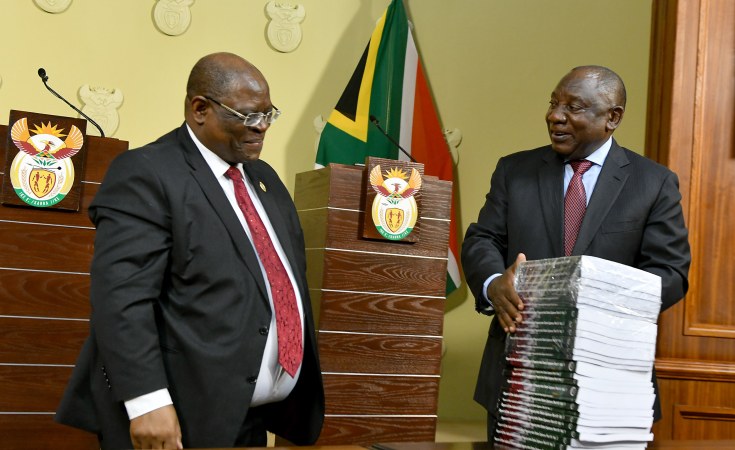One of the greatest benefits of South Africa's democracy is freedom of speech and publication. Mpumelelo Mkhabela's book, The Enemy Within, is the latest in a cascade of publications over the last decade that record corruption and theft by leading politicians in the country's ruling party.
In all too many countries in Africa and Asia a book like this would result in its author's detention, censorship of the book, persecution of the publishers and printers, and harassment of bookshops that sold it.
South Africa is among a select group of democracies that permit such exposés. Books that have explored the deepening levels of corruption in the country include How to Steal a City, How to Steal a Country, Gangster State and After the Party.
The Enemy Within takes readers through a series of well-publicised corruption scandals. It argues that the African National Congress (ANC) lost the fight against corruption by tolerating corrupt practices, failing to hold the corrupt to account, and going as far as to shield them. The ANC has governed South Africa since the formal end of apartheid in 1994.
Corruption scandals
Mkhabela, a former newspaper editor, considers the ANC's first big test of ethics - which it failed - was in 1996 when it expelled cabinet minister Bantu Holomisa from the party. The reason was that he'd stated publicly that ANC cabinet minister Stella Sigcau had earlier in her career accepted a bribe.
The book then goes through other prominent cases of corruption. The scandals include the looting of VBS mutual bank, which involved "theft, abuse of power, robbing of the elderly, and even murder" (four members of the South African Municipal Workers' Union were killed). (p.41)
There was the rare imprisonment of an ANC MP - Tony Yengeni, in 2003, for fraud and corruption. There was also the theft of public funds intended for a memorial service for Nelson Mandela. Then came the procurement by transport parastatal Transnet of locomotives that were too tall to be used on most of the country's railway lines.
Jacob Zuma, then president, dismantled the Scorpions police unit, which specialised in priority crimes. Public funds were misused for his private residence. The company Bosasa allegedly greased the palms of ANC politicians in return for huge contracts with the prisons department. After a wave of Zuma appointments to the National Prosecuting Authority, the book says, the authority
was clearly dancing to the tune of top ANC politicians. (p.123)
The case of Jackie Selebi, the erstwhile head of police, shows two ANC failings. Mkhabela reminds readers of the lack of condemnation from the ANC when Selebi was convicted of corruption in 2010.
To this I would add a second point about cadre deployment: Selebi had no training or on the job experience in policing. Had he been kept in diplomatic postings, scandals would almost certainly never had occurred.
The ANC appears blind to this obvious point.
The robbing of funds for a Mandela memorial service reveals another surprising truth. These municipal funds had initially been earmarked to subsidise poor families (p.74) who could not afford municipal services such as water and electricity.
Most politicians would consider that invaluable for their subsequent electioneering. But politicians diverted or stole the funds. In short, so extreme was their personal greed that it even undermined their efficacy as politicians.
In summarising widespread corporate collusion with corruption, Mkhabela notes that companies hide bribes under the "cost of business" item in their balance sheets. (p.63)
Then there is the pattern of assassinations.
Anyone who threatens to expose tender corruption risks being eliminated by hired hitmen. In some instances, once caught and convicted, the hitmen are even looked after in prison (p.67)
ANC leaders
South Africa had
a toxic mix of old money, businessmen eager to win favours from politicians, and political leaders ready to tackle anyone who dared make corruption claims against the party. (p.21)
None of the ANC's leaders have behaved well. Even Nelson Mandela, who pressed for the dismissal of Holomisa and asked the leader of the South African Communist Party, Jeremy Cronin, to write a leaflet denigrating him.
Mkhabela notes that Thabo Mbeki, as president, was conflicted: he deplored corruption. But he regarded every exposé as a white racist attack.
Mbeki signed up South Africa to the Southern African Development Community Protocol against Corruption, the UN Convention against Corruption, and the OECD Anti-Bribery Convention.
Also to his credit, Mbeki set up autonomous institutions against corruption that survived his own efforts to undermine them. It would require major exertions on the part of Zuma, who succeeded Mbeki as president, to dismantle them. (p.55)
Zuma had to emasculate the prosecution authority to avoid being prosecuted himself; he had to undermine the South African Revenue Service to prevent being sued for unpaid tax. These allowed a host of the corrupt to capture the state.
The rebuilding of these institutions has taken the whole of Cyril Ramaphosa's presidency to date.
But Mkhabela misses one pertinent point. Mbeki oversaw massive pay rises for the top posts in politics, the bureaucracy including the municipalities, and the parastatals. This hugely raised the stakes in ANC political battles. Mbeki never reproached Smuts Ngonyama, then the ANC's spokesperson, for his widely quoted comment
I did not struggle (in the liberation movement) to be poor.
In his conclusions Mkhabela says:
The incentives and rewards for being corrupt for the politically connected far outweigh the risks of being caught in the act. (p.198)
But he ends by noting that corruption generates pushback from the public.
Keith Gottschalk, Political Scientist, University of the Western Cape


